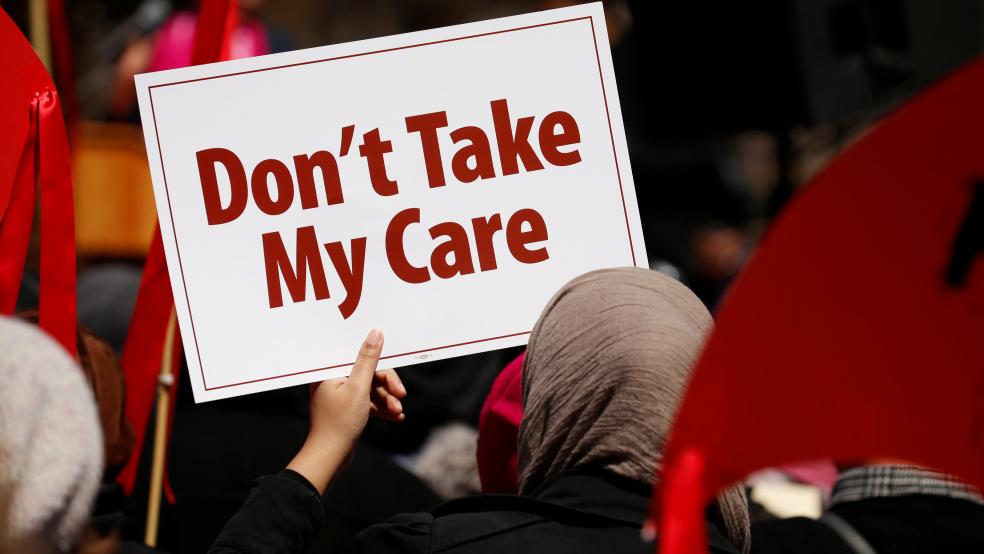This has been a rough year for the Congressional Budget Office (CBO), the non-partisan analyst and score keeper, which has repeatedly been hammered by the Trump Administration and Republican leaders for its devastating assessments of the long-term effects of the House and Senate’s plans to repeal and replace the Affordable Care Act.
From all indications, things will get even rougher for the agency in the coming weeks as Congress nears the make-or-break point in passing new health care reform legislation this summer.
Related: Trump Once Again Scrambles GOP’s Efforts to Repeal and Replace Obamacare
Before departing for the July 4th recess, Senate Majority Leader Mitch McConnell (R-KY) reportedly submitted a new version of his Better Care Reconciliation Act to the CBO and asked for a new estimate of its long-term cost, premium levels and impact on the number of insured Americans – but with a twist.
In a bid to placate conservatives, McConnell asked CBO to do a separate analysis of a different version of the bill drafted by Sens. Ted Cruz of Texas and Mike Lee of Utah, Axios reported. Cruz and Lee have been working quietly behind the scenes to amend the Republicans’ repeal and replace effort to make it more palatable for conservatives. Their amendment would allow insurers to sell cheap health plans that don’t meet the current minimum standards of the Affordable Care Act as long as they sell at least one plan that does provide all those protections.
If approved, this approach would allow insurers to get around the current ban on charging much higher premiums and copayments to people with preexisting medical conditions who are much costlier to cover than younger, healthier people.
Related: Senate Health Bill Would Drive Coverage Down by 22 Million: CBO
With so much riding on the outcome of CBO’s findings next week, the agency is sure to feel the mounting political heat. GOP critics repeatedly charge that CBO has a checkered record in forecasting the impact of health care laws, especially when it came to predicting enrollments under the Affordable Care Act.
Health and Human Services Secretary Tom Price insisted over the weekend on NBC’s Meet the Press that the CBO’s analytical techniques are outmoded and fail to capture the overall effect of GOP health care reforms, while White House Budget Director Mick Mulvaney recently suggested the CBO had outlived its usefulness and should be abolished.
Sen. John Cornyn of Texas, the second-ranking Republican leader in the upper chamber, has called CBO estimates “fake news.”
Related: 7 Huge Tax Breaks in the Senate GOP Health Care Plan
Keith Hall, the current CBO director and a Republican who was handpicked for the job by Price when Price headed the House Budget Committee, has remained relatively silent in the face of the criticism and controversy. However, some past directors and staff members of the agency have rallied to his side.
In a recent blog post, Rudolph Penner, the director of CBO from 1983 to 1987, stated, “If it were not for CBO, the policy debate would be dominated by an administration’s estimates of the effects of its own initiatives and by estimates from the proponents and opponents of legislative proposals.”
Penner said that CBO’s work is especially important at times like these when one party controls both chambers of Congress, and the White House and the minority party can be steamrollered unless it is armed with good information.
“Like all forecasters, CBO makes mistakes,” Penner conceded. “It is frequently asked to make forecasts that are much more challenging than predicting the weather or the outcome of sports events. . . But a forecast does not have to be perfectly accurate to be useful.”
Related: Trump Uses His ‘Discredit Tactic’ on CBO to Hedge Against Negative Report
“If a weather forecaster predicts three inches of rain and only two inches fall, it can be said that it was a terrible forecast in that it was off by one-third,” he added. “Nevertheless, it was useful to know that a lot of rain was coming. Similarly, when CBO predicts that more than 20 million fewer people will have health insurance coverage in 10 years under AHCA than under current law, its qualitative message of large coverage changes is valuable.”
CBO’s initial findings this spring that the House GOP approach could result in as many as 23 million Americans losing their health care coverage in the coming decade than under current law and temporarily drive up premiums badly set back the American Health Care Act. After some retooling by a group of conservatives and moderates, the bill narrowly passed the House in early May.
If Senate Republican leaders had hopes that their alternative approach to overhauling Obamacare would fare better with the CBO, they were sadly disappointed.
Related: The Obvious Problem With the ‘Simple’ GOP Solution for Health Care
Despite taking a different approach from the House, including a different set of subsidies and a slower phase-out of the Obamacare Medicaid expansion, CBO found in its report June 26 that the Senate bill would result in losses of insurance coverage very similar to those projected from the House bill. Twenty-two million people would lose their coverage by 2026, including 15 million low-income people on Medicaid.
CBO’s latest findings forced McConnell and other GOP leaders to go back to the drawing board, in search of compromise measures to placate both moderate Republicans concerned about the Medicaid cuts and conservatives determined to eliminate more Obamacare regulations.





